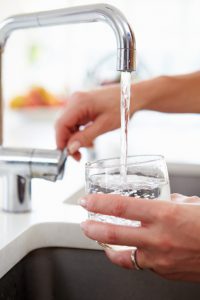 Over the past twenty years, the consumption of bottled water has become so common, the sales are second only to bottled soda and eclipse both milk and alcohol. But is there really a benefit to drinking bottled water over tap water? Let’s compare the facts and find the real story.
Over the past twenty years, the consumption of bottled water has become so common, the sales are second only to bottled soda and eclipse both milk and alcohol. But is there really a benefit to drinking bottled water over tap water? Let’s compare the facts and find the real story.
The safety of municipal water in the 1800s was suspect and not regulated, and bottled water was definitely a safer gamble. The start of water chlorination in the early 20th century and the Safe Drinking Water Act of 1974 changed that, and the popularity dropped off. With the invention of strong polyethylene terephthalate (PET) bottles in the mid-1980s, making plastic bottles more convenient and cost-effective than ever before, soda companies like Coca-Cola and Pepsi started selling bottled water to the same outlets already carrying their carbonated drinks. Clever marketing campaigns by the likes of Perrier convinced consumers that upwardly-mobile people drank their water, and you should, too.
But bottled water isn’t all it’s cracked up to be and causes more damage than most of the public realizes. To start with, the cost difference is no small matter. In 2013, the average cost per gallon of bottled water was $1.21, compared to roughly $2.00 for every 1000 gallons of tap water. To put that into perspective, if you buy a 16.9-ounce bottle of water for $1.00, you are really paying $7.57 per gallon – more than 3,000 times the cost of tap water!
A large number of people think bottled water is safer and more sanitary than tap water. To be honest, there really isn’t a difference. Both types of water are highly regulated – bottled water through the Food and Drug Administration and municipal water through the Environmental Protection Agency. The safety standards for both bottled and tap water are identical – but bottled water isn’t subject to the same stringent reporting standards as tap water. Water bottling companies don’t have to reveal the source of their water or how they have treated it, and most of the time the bottled water came out of the tap in the first place.
What about the environmental impact of bottled water vs. tap water? It takes almost 2 liters of water to produce a single 1 liter bottle of water, depleting natural sources of water unnecessarily. The manufacturing of the plastic bottles used spits toxic chemicals into the air, including nickel and ethylene oxide, which can cause health issues ranging from lung irritation and breathing problems to neurological disorders. Are you aware that out of roughly 42.6 billion single-serve water bottles purchased yearly, only 20% are recycled? That means over 34 billion non-biodegradable plastic bottles end up in landfills, littering our cities and countrysides and killing off ocean life every year.
You don’t have to be tied to bottled water – there are many ways to break the habit! If you feel your tap water doesn’t taste the way you would like, there are many options for water filters designed for use in the home. There are refillable filtering water pitchers that fit in the refrigerator, or faucet attachments that filter the tap water as it comes out. If you are addicted to the convenience of carrying a bottle of water with you, there are also a lot of choices of safe, reusable water bottles with many including a carrying strap or backpack attachment. Exercise your right to information by reading through the Consumer Confidence Reports for Osceola and learn about the naturally-occurring contaminants found and the treatments used to battle them.
People need water, and in America we are exceptionally lucky to have immediate access the the turn of a tap. Bottled water isn’t necessarily worse than tap water, it just isn’t better, either, and the far-reaching effects associated with bottled water can do irreparable damage. The next time you reach for a drink of water, twist that faucet handle and feel confident that Osceola tap water is the right choice for your health, your environment, and your wallet.
